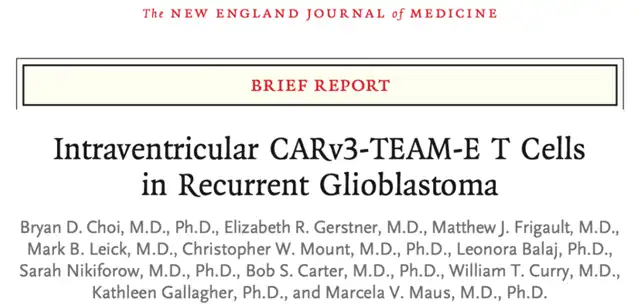Breakthrough in CAR-T therapy: Tumors almost completely disappear in just 5 days
- Normal Liver Cells Found to Promote Cancer Metastasis to the Liver
- Nearly 80% Complete Remission: Breakthrough in ADC Anti-Tumor Treatment
- Vaccination Against Common Diseases May Prevent Dementia!
- New Alzheimer’s Disease (AD) Diagnosis and Staging Criteria
- Breakthrough in Alzheimer’s Disease: New Nasal Spray Halts Cognitive Decline by Targeting Toxic Protein
- Can the Tap Water at the Paris Olympics be Drunk Directly?
Breakthrough in CAR-T therapy: Tumors almost completely disappear in just 5 days
- Should China be held legally responsible for the US’s $18 trillion COVID losses?
- CT Radiation Exposure Linked to Blood Cancer in Children and Adolescents
- FDA has mandated a top-level black box warning for all marketed CAR-T therapies
- Can people with high blood pressure eat peanuts?
- What is the difference between dopamine and dobutamine?
- How long can the patient live after heart stent surgery?
Breakthrough in CAR-T therapy: Tumors almost completely disappear in just 5 days
CAR-T cell therapy uses the patient’s own immune cells to fight cancer and is the most personalized cancer treatment method. It involves extracting the patient’s T cells, modifying them through genetic engineering to produce chimeric antigen receptor (CAR) proteins on their surface, and then reintroducing these CAR-T cells into the patient’s body to directly target and eliminate tumor cells.
Since its first approval in 2017, six CAR-T cell therapies have been approved by the FDA for the treatment of blood cancers such as leukemia and lymphoma. However, CAR-T cell therapy has shown limited effectiveness in solid tumors, which account for the majority of cancers. One major reason is the high heterogeneity of solid tumor cells, meaning that even after receiving CAR-T cell therapy, some cancer cells can evade immune system surveillance.
On March 13, 2024, researchers from Harvard Medical School, Massachusetts General Hospital, Dana-Farber Cancer Institute, and other institutions published a research paper titled “Intraventricular CARv3-TEAM-E T Cells in Recurrent Glioblastoma” in the prestigious medical journal The New England Journal of Medicine (NEJM).
The paper reported the first human clinical study of CARv3-TEAM-E T cell therapy in patients with recurrent glioblastoma, aiming to evaluate the safety of this new treatment approach.
In this phase 1 clinical trial, three patients with recurrent glioblastoma received the cell therapy, and within just a few days, their tumors showed significant regression, with one patient’s tumor almost completely disappearing. None of the three patients experienced grade 3 or higher adverse events or dose-limiting toxicities.

This therapy is the result of years of collaboration and innovation from Marcela Maus’ laboratory at Massachusetts General Hospital Cancer Center, which has established a team of collaborating scientists and medical experts to rapidly advance next-generation gene-modified T cells from laboratory research to clinical trials in cancer patients.
The team had previously developed CAR-T cell therapy targeting the epidermal growth factor receptor variant III (EGFRv3), a tumor-specific antigen in glioblastoma (expressed in over 80% of patients but not in normal brain cells), which showed limited efficacy when used alone.
To overcome this limitation, the researchers combined two independent cancer treatment strategies—CAR-T cell therapy and bispecific antibodies—by engineering the CAR-T cells to express and secrete a T cell-engaging antibody molecule (TEAM) targeting wild-type EGFR, thus developing the CAR-TEAM therapy.
The researchers first confirmed the promising therapeutic effects of this approach in preclinical studies for glioblastoma and then initiated the INCIPIENT phase 1 clinical trial, a non-randomized, open-label, single-center trial that involved direct injection into the brain for patients with recurrent glioblastoma.
Between March and July 2023, a total of three patients with recurrent glioblastoma were enrolled in the study. The team collected T cells from these patients, converted them into the novel CAR-TEAM cells, and then injected them into the patients’ brains. Throughout the study, the patients’ toxic reactions were monitored.
All three patients had previously received standard radiotherapy and temozolomide chemotherapy and were enrolled in the clinical trial after disease recurrence.
Patient 1: A 74-year-old male who experienced rapid tumor regression after a single infusion of CAR-TEAM cells, with a subsequent undetectable level of EGFRvIII and EGFR copies in his blood and cerebrospinal fluid.
Patient 2: A 72-year-old male whose tumor size decreased by 18.5% after two days of a single infusion of CAR-TEAM cells and by 60.7% by day 69, with the relief lasting over 6 months.
Patient 3: A 57-year-old female whose tumor almost completely disappeared after a single infusion of CAR-TEAM cells for 5 days.
Overall, these patients tolerated the treatment well, with fever and changes in mental status shortly after treatment, as expected with direct CAR-T cell therapy to the brain.
Although the initial responses of the first three patients treated were significant, with one patient experiencing no disease progression for over 6 months, all three patients eventually experienced disease progression, partly due to the limited persistence of CAR-TEAM cells in the weeks following infusion. The research team is considering continuous infusions or chemotherapy pretreatment to prolong the time to disease progression.
Marcela Maus stated that these preliminary clinical results are exciting, but it is only the beginning. It tells us that we are on the right track in pursuing a treatment approach that could potentially change the outlook for this challenging type of cancer. We have not yet cured these patients, but that is our ultimate goal.
Breakthrough in CAR-T therapy: Tumors almost completely disappear in just 5 days
(source:internet, reference only)
Disclaimer of medicaltrend.org
Important Note: The information provided is for informational purposes only and should not be considered as medical advice.



